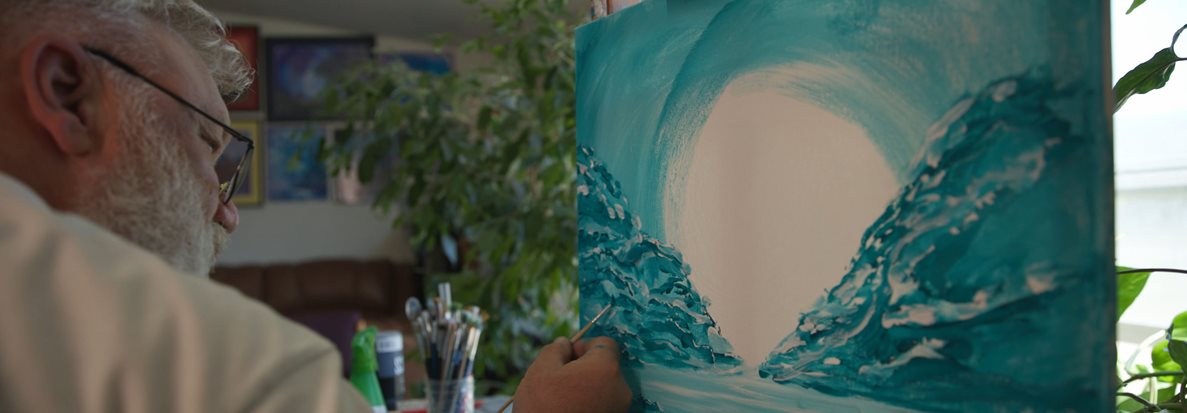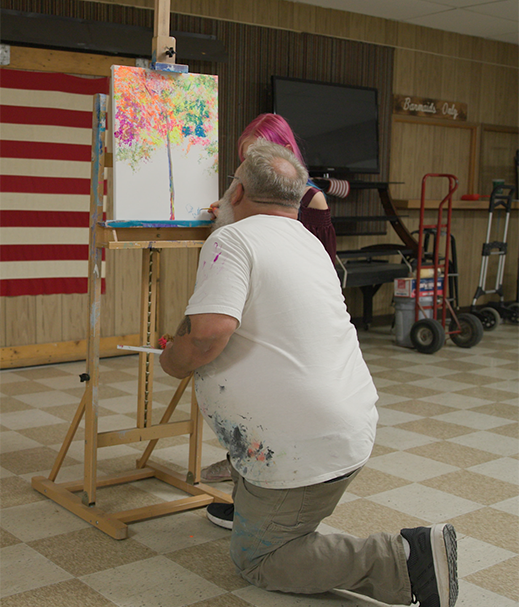When Life Gives You Lemons, Make Art.
Life doesn't always go in the direction we think it will go. Sometimes the straight path we see ahead takes a sudden turn or a dip we can't ever imagine, changing not only the landscape around us, but the one inside each of us. What was once black and white suddenly turns into chaotic colors that stray outside of the lines. Nothing seems to follow the rules. And as WCU member and artist David Williams will attest, that's when life as we know can either break us... or become something more incredible than we can ever imagine.
“Let me start from the beginning.”
When he was part of the United States Navy, David saw his life plan unfolding before him. First a plane technician, then a software engineer.
“How I viewed it was chasing wires and writing code are probably in the same book,” he says. “And I wanted a big house, I wanted a big yard, I wanted the American dream.” But that all changed when a head injury changed everything. Not only did it result in varying kinds of seizures and depression, but in one crushing blow, the inability to follow his dream.
“I know one plus one is two and the simple stuff, but when you get into, you know, trigonometry and linear algebra—and these are all processes needed to write a computer code. I couldn't do those processes. I struggled with them. I fought with them. I just didn't understand anymore. I didn't understand the functionality of it.”

For David, the rules had changed without his consent or his permission. And under that big, wide, and cerulean Montana sky, David faced a choice. A choice that had not only greeted far too many veterans before him, but a choice that for some, turned into a terrible darkness. One that not all of them can escape.
“Military guys, when they come out, it's all, 'What's my purpose?' Because in the military, we're all designed with one goal in mind. When you get out in the real world [it's] what's my purpose? Part of my traumatic brain injury is depression. And when you become depressed, people don't wanna be around you... You're walking this path and you tend to be alone, whether it's in your house with the windows closed, the blinds closed. You're not really wanting to see anybody, not wanting to do nothing. And that's kind of where I found myself.”
And so David found himself and made his choice. Art. And life. And making life richer and more colorful not only for himself, but those other veterans in the community.
 The first and most arresting feature you notice talking to David is his eyes, bright, alive, the same cerulean as the Montana sky. These are eyes that haven't just seen things—they see. They see loss as much as love, color and shadow, and they see dreams lost and new ones found. As he speaks, his voice filled with easy warmth, he gestures with a paintbrush in one hand, and the other covered in vibrant cobalt turquoise paint. Behind him, dozens of paints in an overwhelming variety of colors from his home in lush valley of Plains, a small town flanked by mountains seemingly on every side. A place filled with beauty and seemingly contradictory space.
The first and most arresting feature you notice talking to David is his eyes, bright, alive, the same cerulean as the Montana sky. These are eyes that haven't just seen things—they see. They see loss as much as love, color and shadow, and they see dreams lost and new ones found. As he speaks, his voice filled with easy warmth, he gestures with a paintbrush in one hand, and the other covered in vibrant cobalt turquoise paint. Behind him, dozens of paints in an overwhelming variety of colors from his home in lush valley of Plains, a small town flanked by mountains seemingly on every side. A place filled with beauty and seemingly contradictory space.
Here, there is the sense that some small towns—even ones with less than 1100 people—can be just as expansive and filled with richness. Or maybe that's just David's art, peppered throughout the town and creating color, texture, and vibrancy wherever he goes.
The truth is that after members of the military leave service—whether it's at the end of service, or for medical reasons—vets don't always find their new path. For some, the path ahead just kind of disappears. The journey that once seemed so clear suddenly ends, taking clarity with it. There's no light showing them way and, lost in a wash of mental health struggles and especially post-traumatic stress disorder (PTSD), vets quickly get lost. In the United States, 22 veterans commit suicide every day. The numbers aren't just alarming, they're devastating. But for some vets, making sense of the world they left and the world in which they now find themselves seems too great a divide. A chasm lies between their life in service to their country and the civilian life they now face. A life which most of us know how to navigate, but for vets is akin to learning a whole new way to live after leaving a world they already understood.
“All you see is the horizon, and you don't see a port,” David says. “You don't see a way out.”
In 2015, David wanted to help his fellow vets the best way he could. But to do that, he needed the help of a banking alternative. He needed a place that was going to look at the people, not just the numbers. That was going to understand what he needed to do. And with the help of Whitefish Credit Union, David created Joint Operation Mariposa. It's a program designed to help vets bridge that canyon between the military life they had and the civilian life in which they now find themselves. Between the soldier they used to be... and the person they are now.
a place that was going to look at the people, not just the numbers. That was going to understand what he needed to do. And with the help of Whitefish Credit Union, David created Joint Operation Mariposa. It's a program designed to help vets bridge that canyon between the military life they had and the civilian life in which they now find themselves. Between the soldier they used to be... and the person they are now.
A bridge created in part by David—and part by art.
David starts painting on a piece of canvas. He wants us to see how the process works. A white center, then his brush furiously surrounds the center by that same cobalt turquoise creating a vortex of vibrant color.
“Stinking Thinking is this process where everyone starts it in the middle of life, you know,” he says, gesturing to the white center, “just kind of like a blank canvas. And then as you go through life... but you know, in places where you have no real control over what's going on, usually, right? You don't understand that you're starting to get into a loop. So you start this circular kinda thought, 'Am I good enough? Did I do the right thing? If I'd have done this, would this have happened over here?' And when you get into that negative thought pattern, it just kind of sinks in that you're not doing the right thing, you're not doing what you should be doing. You're just not approaching the way you want. So the idea, once you get into this pattern,” points to the canvas, “that you need to break it.”
Here, David brushes some of that strong turquoise color onto the canvas, breaking across the vortex and creating a connection from the center to the edge of the canvas like pigmented stepping stones. “So if you break it you just kinda put things in its way. You just interrupt it. You know, a different thought pattern.”
In David's work, this central vortex theme provides the backdrop for some of the surreal, almost psychedelic-inspired landscapes, some eerie, mostly vibrant movements of color, where nature and chaos are seemingly blended by brush to capture a moment, a glimpse of a world that captures something both otherworldly, and comfortingly calming. The landscapes of a psyche that has seen perhaps too much, perhaps, and yet found the continuity of beauty.
“And once I came to understand that you gotta quit fighting yourself and you gotta change direction, change your tack. Then things start to move, they're slow. For me this is a process that's been happening over forty years now.”
David's life changed in a moment, changing not only what he wanted and what he could do, but who he was. And when he quit “fighting” himself, he found he was so much more than that one dream he once had. In that moment, he found another destiny, still creating. Only it became a different kind of creation, one that could be shared and taught, and used to light the way for others who have been lost.
David is not a beacon of light so much as a beacon of color, shining through all of the pigments in his palette.
“Once you start enjoying it, you stop worrying about the other things. You're just in the moment. And when you're in the moment, you become freer.”
For Montanans like David, communities are never about just the land. Instead, they are about the people who inhabit the spaces, move within them, and create change not just in their own lives, but for those around them. Those people who find the light inside themselves and share it with others.
For those who are hurting. For those who are struggling. And for those who know that community is more than just a place on a map.
Discover more about Joint Operation Mariposa and how you can support vets here.

For Members Like You. Because What We Do Pays Dividends.
